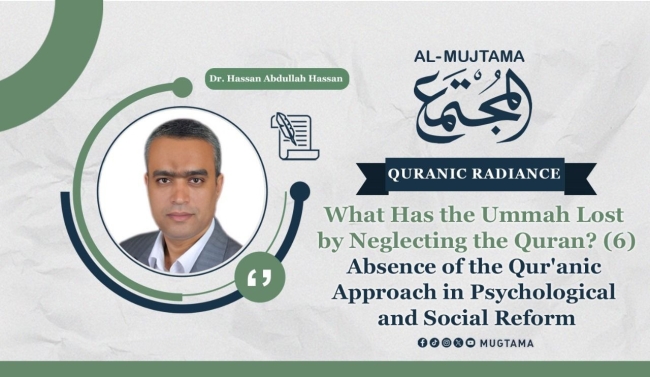What Has the Ummah Lost by Neglecting the Quran? (6) Absence of the Qur'anic Approach in Psychological and Social Reform
The Qur'an presents a unique approach to psychological and social reform due to its understanding of the nature of the self, its ailments, and ways of treating them. It also establishes rules and laws for societal conduct and methods for addressing social problems throughout human history, encompassing rules for social conduct, warnings, and methods for dealing with potential issues.
The Qur'an does not oppose the individual for the sake of society nor elevate the individual at the expense of society. Instead, it outlines a unique map where the individual harmonizes with society, allowing the individual's potential to flourish to the fullest extent while organizing society under rules and limits governed by the rights of people, which are considered the rights of society and, in the Qur'anic law, "the rights of God" that no one has the right to waive or neglect.
Furthermore, the Qur'an does not abolish individual desires and aspirations nor call for asceticism. It acknowledges human desires and provides a framework for their fulfillment, ensuring that individuals do not transgress and disrespect the rights of society (which are considered the rights of God). The Qur'an aims to achieve psychological and material balance for individuals by permitting marriage to fulfill sexual desires, preserve the species, and build society.
Similarly, the Qur'an recognizes the human instinct for ownership but stipulates that acquisition should be lawful, spending should be neither wasteful nor stingy, and one must fulfill God's rights, which are the rights of people. It does not forbid enjoyment or adornment in life and does not regard the world as inherently sinful. Instead, it views the world as part of the eternal hereafter, considering human work and efforts in this world as sacred as long as they adhere to the Qur'anic methodology for benefit and reform while avoiding individual and social harm.
Thus, the Qur'an does not deprive individuals of any desire or aspiration but places it within the framework of individual and social benefit and reform.
The Qur'an has established clear rules for individuals and society, applying them to everyone without exception, except in cases of physical or financial inability. This equality surpasses that found in contemporary laws, which are often created to be circumvented. These rules represent a clear map of social values, established not by any individual or group, nor favoring any power, authority, person, or group, but serving all humanity—especially the weak before the strong, the poor before the rich, the subordinate before the superior, the young before the old, and women before men.
Muslims—and indeed the contemporary world—have lost much by abandoning the Qur'an and removing it from their social, cultural, and educational lives. They have failed to present a contemporary model that embodies the Qur'an, demonstrating its unique ability to reform societal dynamics, cultural movement, educational philosophy, and educational building. This failure stands in contrast to the Western Darwinian principle of conflict that governs both individual and societal dynamics.
The modern person has lost a comprehensive methodology integrating material and spiritual life, where there is no need for conflict, tension, or disruption in choosing between them. The modern person has also lost a methodology that harmonizes individualism and collectivism without sacrificing one for the other, integrating worldly life with the afterlife without needing to separate them.
In addition to the Qur'anic methodology seamlessly merges the visible with the unseen without discord, aligns the absolute with the realistic without contradiction, and integrates the ideal with the practical without intellectual or emotional conflict.
The absence of a Qur'anic model in the cultural and social fields has given rise to the dominance of conflict as a principle in individual and social life, established by the contemporary Western model influenced by Darwinian and Zionist thought. This has led to the spread of psychological disorders at the individual level and social conflicts at the societal level, such as class struggles, generational conflicts, and cultural clashes, promoted by Samuel Huntington and implemented by the United States and its Western allies. Consequently, conflict has become the main feature of the contemporary world, where a tangible Qur'anic model is absent among its adherents, leaving the world without a guiding example.
Unfortunately, Western value systems have permeated modern society, including the Islamic world, where sacred principles and ultimate goals, which could provide moral standards for right and wrong and ethical judgments, have been sidelined. As a result, the nation has become dependent on a social and moral value system that does not recognize the sacred or the absolute. Human objectives have become focused solely on accumulation and control, with no room for ethical laws, and only utility, pleasure, and maximizing production for the sake of maximizing consumption prevail.
The principle of conflict as the basis for social order and history inherently carries the seeds of self-destruction for societies. These societies remain under the fire of conflicting ideas, known in modernity as endless dualities—such as the worldly and the hereafter, the material and the spiritual, the individual and society, the religious and the secular, nature and nurture, religion and politics, and so on. These dualities drain the energy of individuals, societies, and civilization.
In contrast, the Qur'anic methodology builds social values on a divine foundation. However, with the Qur'an sidelined, the nation has constructed its value system through the influence of wealth, power, and desires. As Nietzsche said, people have given themselves all their good and evil; they did not receive them from a higher power nor descended from the sky. Their daily life and physiological and social needs drive them to attribute certain values to things. Therefore, ethical values are neither eternal nor absolute but relative, dependent on the changes in their biological and social motives. This purely materialistic perspective dominates modern social ethics (1), which has replaced the Qur'an in the nation's social structure.
-------------------------------------------------------------
(1) Mohammed Abed Al-Jabri: "Issues in Contemporary Thought," p. 48.

